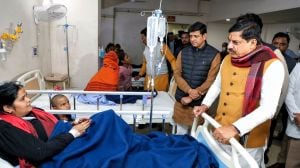Parliament 2015: Good beginning, bitter ending
During the Budget session, the two Houses exceeded the optimum efficiency levels, while the monsoon session recorded a dismal performance by the Rajya Sabha.

The blockage of two big-ticket government bills by the opposition parties and the passage of a land-mark Private member’s bill in the Rajya Sabha marked what has been an eventful year for the Indian Parliament.
The government could not get its two key economic reform bills — The Constitutional (122nd Amendment Bill) (GST) Bill, 2014, and The Right to Fair Compensation and Transparency in Land Acquisition, Rehabilitation and Resettlement Bill — passed because of its lack of adequate numerical support in the Rajya Sabha.
Tiruchi Siva of the DMK created history of sorts when the Rights of Transgender Persons Bill, 2014, moved by him, was unanimously passed by the Rajya Sabha during the Budget session. Both Houses have Friday afternoons earmarked for Private members’ business. While there are many such bills every session very little comes of them. Siva has the distinction of piloting a bill for the first time in 47 years.
The year witnessed Parliament at its best and worst both. During the Budget session, the two Houses exceeded the optimum efficiency levels, while the monsoon session recorded a dismal performance by the Rajya Sabha.
Lok Sabha
The Lok Sabha, where the BJP and its allies are in a commanding position, showed a very high degree of productivity — 123 per cent — during the budget session. The two Houses passed all the 16 bills which had been lined up. The productivity level drastically fell to 48 per cent in the monsoon session thanks to disruptions over the Lalit Modi controversy. Though 11 bills were on the agenda for consideration, only one was passed — The Delhi High Court (Amendment) Bill, 2014.
The winter session’s productivity went up to 100 per cent but hardly a day went by when Question Hour was conducted peacefully. Opposition members were in the well of the House every day protesting against provocations ranging from the National Herald case and the actions of the Arunachal Pradesh Governor to the Delhi cricket body controversy.
Rajya Sabha
The Rajya Sabha’s productivity peaked at 102 per cent in the Budget session. Though the Opposition which dominates the House, lent its support to the government in passing bills, it forced an amendment to the Motion of Thanks for the Presidential Address. The amended motion expressed regret that the government had not taken any steps to curb corruption and black money.
In the next session, the Opposition was in a different mood. With the House paralysed over Lalit Modi, the productivity level nose-dived to nine per cent. During the winter session, the productivity rose to 46 per cent but this was only a theoretical rise: The House was dysfunctional for most of the time but six bills were passed – without any discussion—hence the increase in efficiency.
The highlight of the winter session was a two-day commemorative sitting of both Houses to mark the birth anniversary of B R Ambedkar and the adoption of the India Constitution.
The one thing which could have happened, but did not happen:
The Right to Fair Compensation and Fair Compensation in Land Acquisition, Rehabilitation and Resettlement Bill.
At one stage, it seemed like the government would manage to push it through, riding on its electoral upswing. However, the Opposition made it refer the bill to a Joint Parliamentary Committee (JPC) headed by senior BJP member of the Lok Sabha, S S Ahluwalia. A total of 14 parties joined hands and mobilised some 100 MPs to walk from Parliament House to Rashtrapati Bhawan with a petition to the President against the bill.
This initiative brought Congress leader Sonia Gandhi and traditionally anti-Congress forces together. The opposition parties succeeded in projecting the bill as an anti-farmer measure and the government had to beat a retreat to cut its losses ahead of Bihar Assembly polls. Prime Minister Narendra Modi announced this in his monthly radio broadcast to the nation, Mann Ki Baat at the end of August: “Tomorrow the Land Bill will lapse and I have agreed to it. The Government will not re-promulgate ordinance, but will include 13 points to reform the land acquisition law to benefit farmers”.
Ahluwalia has since obtained extensions for the JPC but the Opposition continues to seek a clarification from the Prime Minister about his announcement. The bill rests there.
The one big thing which may happen in 2016: GST
The Opposition had prevailed upon the Government to refer the GST Bill to a Select Committee of the Rajya Sabha. However, once the report came, the Congress flagged its reservations over three points and sought suitable changes. The Prime Minister invited Sonia and former prime minister Manmohan Singh for discussions at the start of the winter session, hoping that they may agree to a compromise which would enable the government to roll out the new GST regime from April 1, 2016. The winter session of Parliament was constantly disrupted and there’s much bad blood between the two major national parties so an early solution to this issue is unlikely. However, given the keenness of a majority of states including those ruled by the Congress, business and trade bodies, the main opposition party may relent later and let it get passed.
- 01
- 02
- 03
- 04
- 05





































